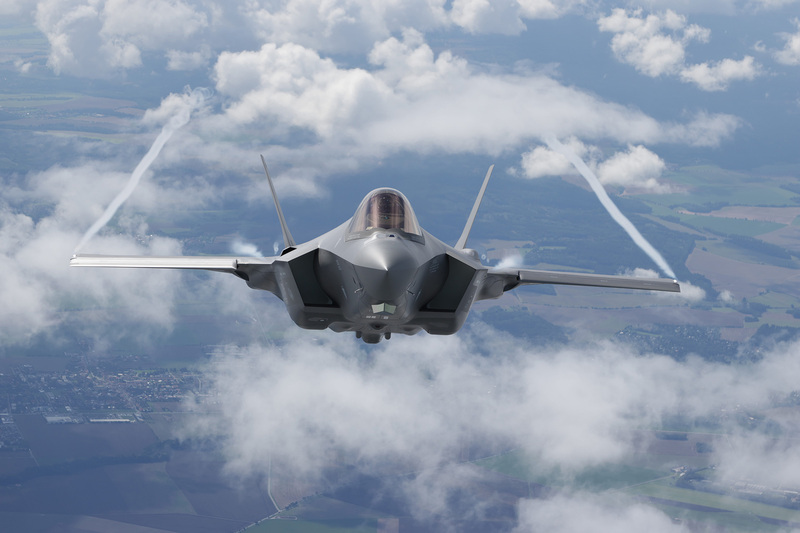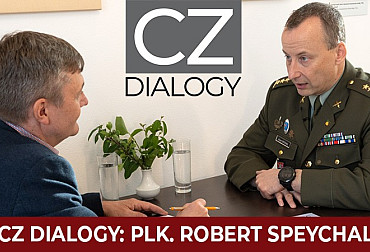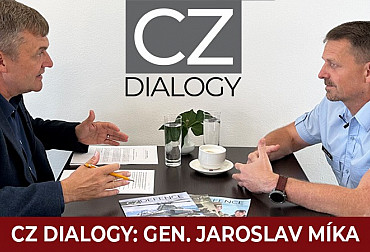Blanka Cupáková: Preparing defence acquisitions is a long run

The enactment of defence spending of 2 per cent of GDP should bring stability not only for the necessary modernisation of the army, but also for the building of other defence infrastructure in our country. It has been pointed out many times that there is a huge internal debt in the form of a lack of investment, which the Czech Army must make up in order to be combat capable and to be a functional part of the North Atlantic Alliance, without which the defence of our territory cannot function today. Thus, not only about key investments, in the next episode of our CZ DIALOGUES programme, we talked with Blanka Cupáková, Chief Director of the Economic Section of the Ministry of Defence, who, among other things, led the negotiating team for the acquisition of the 5th generation F-35 aircraft.
Video: Interview with Blanka Cupáková, Chief Director of the Economic Section of the Ministry of Defence of the Czech Republic / CZ DEFENCE
"Apart from mandated expenditure, defence spending is always a multi-year project. Therefore, the stabilisation of defence spending is a message first and foremost to the procuring entities that everything has long-term financial backing. At the same time, it doesn't mean that they can somehow breathe a sigh of relief; it's all about doing a lot more work with the projects awarded. And above all, from the point of view of economic planning, this is a new experience in the ministry," explains Director Cupáková, adding: "We have trained in previous years, our budget has been flying up and down, it has been a huge school."
The 2% of GDP level for defence will also be a variable going forward. "If we were to calculate the budget for the defence ministry now, we would be somewhere between eight and nine billion lower than what we have budget projections for now. But the forecast from April this year will be crucial, which will be used to calculate the limits for the budget proposal. But we can certainly manage that. It is terribly important for us to know this in advance. Then we can work with it. Of course, in practice, this means nothing more than taking projects according to priorities and moving what is not under contract, because there is nothing else we can do," reveals Blanka Cupáková.
For the Alliance, the amount of defence spending by individual countries is also a sensitive issue. As not only Defence Minister Jana Černochová, but also our Alliance partners state, 2 percent of GDP is not only a necessity for maintaining the defence capability of the state and NATO, but at the same time it is rather a basis at this time. This expenditure is then reflected not only in the budget of the Ministry of Defence, but also in the budgets of other ministries. Determining the adequacy of expenditures is a learning process for DoD officials, although the methodology already exists in NATO. "The methodology is unambiguous, although its variability lies in interpretation. The binding nature is determined only by NATO itself. We approach it in a certain way as we interpret it. As our Minister has said many times, because we have promised that if we have defence expenditure of two per cent, we will try to incorporate the expenditure of other chapters. So we tried to put the maximum in the first time. We will see what the Alliance recognises. I don't think it will acknowledge everything. None of us think it will. But we will see and we will try to justify it," plans the chief director of the economic section of the MoD. The ministry had already sent documents in this format last year. "The actual statement itself, when we defend up to the expenditure made, that will be the key. And that will be in 2025. That's where we'll see for the first time how they will recognise our defence spending as a whole," Cupáková said.

Within the framework of the Ministry of Defence budget, we were interested in how acquisitions are generally handled. "It starts with how much money there is and then the requirements start to form. And the substantive requirements quite logically come from the military, because my section is not the one that is supposed to create the substantive requirements for the military. It takes 90 percent of the defense budget. It knows what it needs to implement various strategies, concepts and so on," explains Director Cupáková.
The readiness of the contracts is then, of course, subject to control. "That is our role, because preparing defence acquisitions is a long run. It's not that you decide today and tomorrow you go to a shop and bring it in. The preparation phase takes years because you have to do feasibility studies, market research and so on. And only then do you compete," says Blanka Cupáková in an interview.
At the same time, it is important to perceive the role of stabilising defence spending. As the amount of defence spending changed over time, it had an impact on the amount of contracts the ministry could procure in a given year. The stability of the budget is therefore extremely important. "As I said, the military spends 90 per cent of its budget and is vitally dependent on the resources available to it and of course chooses its priorities accordingly. It chooses its purchases accordingly, it staggers its purchases over time, because they're not usually one-year purchases. They are large acquisitions," points out Cupáková, noting that postponing or delaying purchases depending on the size of the budget is common. "This happens practically very often when money is cut. Whether it was two or three billion. Projects that you don't have under contract, you take them and postpone them. When you defer the project, it doesn't mean you take it as is in a year or two. You have to do another job on it again, you have to re-price it and so on. So in a way, it's terribly important to motivate people to make sure that the things that they work on once, that we don't keep putting them off. That's why stability is so important to us. If you have the same number of people and they do some work and then it goes to waste, it is very difficult to motivate those people," the chief director points out the issue of the workload of the team of the economic section of the MoD.
The preparation process is quite long and detailed. What fulfils the required military capability is defined. Feasibility studies and market research have to be done to find out what exists on the market to meet the army's requirements. All the technical parameters are specified, the market research is evaluated and a price estimate is made accordingly. This has an impact on the later spending of the budget. "And then it only goes to the acquisition stage and the documents are handed over to the ministry, to the acquisition section, which ensures the Public Procurement Act and its implementation, and at the same time many other tasks are running. For example, all investments above 300 million have to go through the approval of the Ministry of Finance and only then can you announce a contract. Then it has to go through the government again. Before you enter into a contract, if the investment is again above 300 million, you have to go to the Ministry of Finance again for approval. There are an awful lot of control points, which I understand, because we are dealing with taxpayers' money and we should be transparent," Blanka Cupáková said in an interview. She also points out that during this process, many problems can arise at the same time when the budget is not implemented as originally planned and alternatives have to be found.
Among other things, Blanka Cupáková also led the negotiating team for the acquisition of 5th generation aircraft in the period when the defence spending law was not yet in place. In her own words, the agreement with the minister was that there must be an idea of how much the purchase will cost and how this total amount will be reflected in the budget. In the course of the negotiations, the government decided to enact 2% of GDP for defence, and that helped.
Negotiations with US partners were then a great school, according to Cupáková. "It was first about getting an idea of what was non-negotiable with the Americans. We were guarding some things and they felt we were guarding them. But I think the biggest effort we had to make in the end was to meet the time. So that by the time we had to present it to the government, we had all the information on the table, because the American administration is incredibly complex. Even when you're acquiring different types of munitions, those processes go through several channels and, like us, it can get stuck in a lot of places," recalls the senior director, who is glad that all the processes, including funding, were eventually set up.

Another important issue in the F-35 acquisition project was industrial cooperation, which was not negotiated with the government but with entities designated by the US government. In this case it was Lockheed Martin and Pratt & Whitney. "It helped us tremendously at the time that the Americans knew that our government was going to make the decisions. This was our pressure that I used permanently, and I must say it worked, and in some things the Americans made concessions that they had never made before, or did things for us that they had never done for anybody. They felt that if they didn't get it done in time, they would be considered as the ones who failed to present something by the agreed deadline," Cupáková adds.
From the very beginning of the negotiations with the Americans, it was clear that there would be no room for the imposition of possible sanctions within the agreement. "On the other hand, no other country has room for sanctions. These are tough rules. What I think really stood on our side was the enormous pressure. When we started negotiating, the Americans didn't know if we were going to buy from them. I can assure you, they were very scared. They were watching what was going on around us all the time and they were very well informed. We left them in that uncertainty because it suited us, we needed to negotiate about some things," recalls Blanka Cupáková, the chief director of the economic section of the Ministry of Defence.
In an interview with Blanka Cupáková, we also discussed inflation clauses, exchange rate policy, the specifics of the Ministry of Defence budget and more. To learn more, listen to the full interview at the beginning of this article.




















